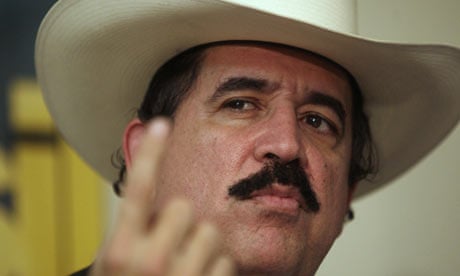Honduras's interim leaders suspended key civil liberties last night in response to "calls for insurrection" by ousted president Manuel Zelaya, empowering police and soldiers to break up "unauthorised" public meetings, arrest people without warrants and restrict the news media.
The announcement came just hours after Zelaya called on supporters to stage mass marches today to mark the three-month anniversary of the 28 June coup that ousted him. Zelaya described the marches as "the final offensive" against the interim government.
Zelaya, who surprised the world when he sneaked back into the country last Monday and holed up in the Brazilian embassy, is demanding he be reinstated to office, and has said that the government of interim president Roberto Micheletti "has to fall".
The government announced the decree in a nationwide broadcast, saying it was "to guarantee peace and public order in the country and due to the calls for insurrection that Mr Zelaya has publicly made".
The measure empowers police and soldiers to arrest without a warrant "any person who poses a danger to his own life or those of others", although unlike martial law, it requires that anyone arrested be turned over to civilian prosecutors.
The Honduran constitution forbids arrest without warrants except where a criminal is caught in the act.
The measure also permits authorities temporarily to close news media outlets that "attack peace and public order".
The media restrictions appear aimed at pro-Zelaya radio and television stations that – while subject to brief raids immediately after the coup – had been allowed to operate freely, openly criticising the government and broadcasting Zelaya's statements.
But under yesterday's order, authorities may now "prevent the transmission by any spoken, written or televised means, of statements that attack peace and the public order, or which offend the human dignity of public officials, or attack the law".
The decree states that the country's national telecommunications commission, known as Conatel, is authorised "through police and the armed forces … to immediately suspend any radio station, cable or television network whose programming does not comply with these regulations".
Pro-Zelaya television station Channel 36 warned yesterday that restrictions on the news media were coming, and said they were part of a pattern by the interim government of curtailing constitutional rights.
The government had previously bragged about the democratic atmosphere in the country, citing outlets such as Channel 36 as proof. The station continued broadcasting without interruption last night.
The interim government also expelled personnel from the Organisation of American States looking to set up a mediation effort and gave Brazil a 10-day ultimatum to either hand over Zelaya or give him political asylum and get him out of the country.
John Biehl, an OAS special adviser, told reporters in the capital, Tegucigalpa, that he and four other members of an advance team – including two Americans, a Canadian and a Colombian – were stopped by authorities after landing at the international airport yesterday. Biehl, who is Chilean, said he was later told he could stay, but the others were put on planes leaving the country.
"A high-ranking official told us we were expelled, that we had not notified [the interim government] that we were coming," he said.
Biehl said he was in Honduras to set up a visit by the OAS secretary general, José Miguel Insulza, who he said would arrive "at the appropriate time".
Micheletti had previously said the OAS was welcome to come, but had suggested that representatives began arriving today.
The foreign minister, Carlos Lopez, said the team's arrival had not come "at the right time … because we are in the middle of internal conversations".
Talks between Zelaya and Micheletti's representatives have produced no results.
A Micheletti spokesman warned Brazilian authorities yesterday to "immediately take measures to ensure that Mr Zelaya stops using the protection offered by the diplomatic mission to instigate violence in Honduras".
The Brazilian president, Luiz Inácio Lula da Silva, immediately rejected the missive, saying his government "doesn't accept ultimatums from coup-plotters".
